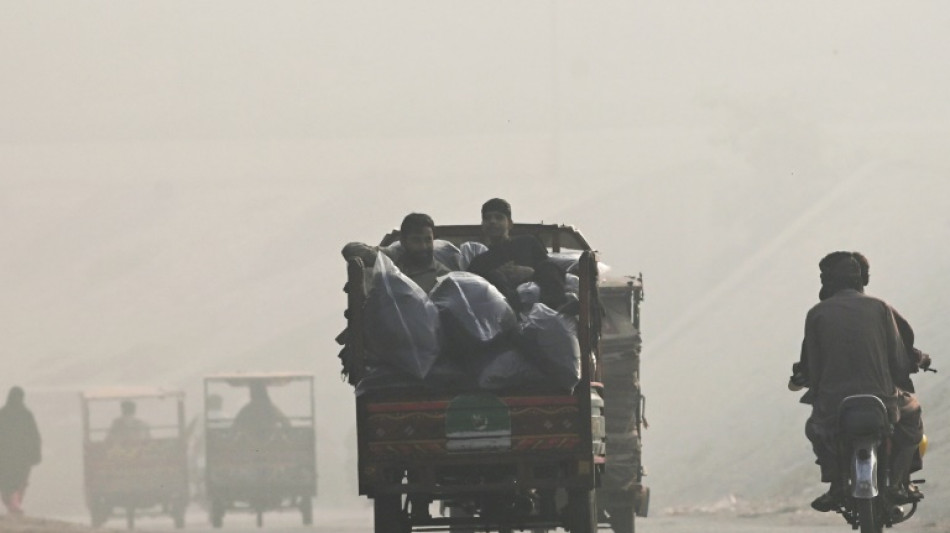
SCS
0.0200


Air pollution in Pakistan's second biggest city Lahore soared on Saturday, with an official calling it a record high for the smog-choked mega city.
For days, the city of 14 million people has been enveloped by smog, a mix of fog and pollutants caused by low-grade diesel fumes, smoke from seasonal agricultural burning and winter cooling.
The air quality index, which measures a range of pollutants, spiked at 1,067 –- well above the level of 300 considered 'dangerous' – according to data from IQAir.
"We have never reached a level of 1,000," Jahangir Anwar, a senior environmental protection official in Lahore told AFP.
"The air quality index will remain high for the next three to four days," Anwar said.
The level of deadly PM2.5 pollutants -- fine particulate matter in the air that causes the most damage to health -- peaked at 610 -- more than 40 times the limit of 15 in a 24-hour period considered healthy by the WHO.
"As a mother, I am full of anxiety," 42-year-old Lilly Mirza told AFP from the choked city.
"Last year was not this bad, it was much better. Somebody needs to tell us what has happened. Did a pollution bomb explode somewhere?"
Mirza said she felt "completely terrorised" after taking her son to a sports match in one of the pollution hot spots: "I came back home so stressed."
Breathing the toxic air has catastrophic health consequences, with the WHO saying strokes, heart disease, lung cancer and respiratory diseases can be triggered by prolonged exposure.
Smog is particularly pronounced in winter, when cold, denser air traps emissions from poor-quality fuels used to power the city's vehicles and factories at ground level.
The smell of toxic fumes has become familiar to 40-year-old painter Rehmat, who goes by one name.
"What can a poor painter like me do if the government can't fix this? I will keep the mask on and work," he told AFP.
- School hours changed -
Last month, authorities banned schoolchildren from outdoor exercise until January and adjusted school hours to prevent children from travelling when the pollution is most punishing.
Children are particularly vulnerable because they have less developed lungs and breathe more rapidly, taking in more air relative to their size than adults.
Last week, the provincial environmental protection agency announced new restrictions in four "hot spots" in the city.
Tuk-tuks equipped with polluting two-stroke engines are banned, as are restaurants that barbecue without filters.
Government offices and private companies will have half their staff work from home starting Monday.
Construction work has been halted and street and food vendors, who often cook over open fires, must close at 8 pm.
Pollution in excess of levels deemed safe by the WHO shortens the life expectancy of Lahore residents by an average of 7.5 years, according to the University of Chicago's Energy Policy Institute.
According to UNICEF, nearly 600 million children in South Asia are exposed to high levels of air pollution and half of childhood pneumonia deaths are associated with air pollution.
M.Chau--ThChM